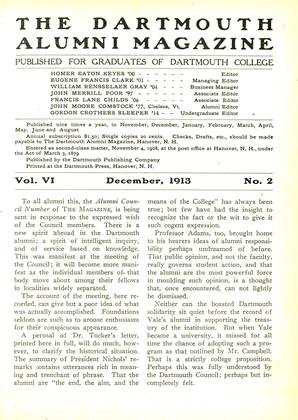Executive Statement
"Section 1. The purpose of this council shall be to give organization and aid for the highest efficiency to all efforts of the alumni of Dartmouth College for the benefit of the college, and more particularly in the following respects .... To approve or disapprove projects put forth in the alumni name, and to be the seat of authority in such matters .... To initiate and carry on such undertakings, or to provide for their being carried on, as are reasonably within the province of alumni activity" ....
"Organization" and "efficiency" as stated in the Constitution of the Alumni Council are the words significant of the purpose of its creators. And such is sought to be obtained with particular reference to certain classes of matters which have been brought to the attention and which have touched the purses of the alumni from time to time through spasmodic efforts to enlist their interest. These projects have been always initiated, by individuals or groups of. alumni, with motives entirely unselfish and entirely worthy, but nevertheless have given rise to the queries: Whence comes the authority? and, On whom is the responsibility? Sentiment often has been divided and effort very often has been wasted on account of such doubt of authorization and such feeling that willing workers were to no particular con- trol. And such projects have covered the range from the alumni-wide and tremendously successful campaign to build a new gymnasium to the more or less local endeavor to finance the needs of the equally commendable purposes of the Outing Club.
And what is the scope of the function of the Alumni Council with reference thereto? By virtue of the constitution adopted by all the alumni as befitting a body by them created by overwhelming vote, the scope must be allembracing. It must and shall, else the entire foundation so creditably and carefully laid must be rejected. And the wording significantly gives over to this council the authority to control and to initiate all "projects put forth in the alumni name" and such undertakings as are "reasonably within the province of alumni activity".
These projects, by the constitution and naturally, group themselves into three classes. The first class includes those matters which will originate from without the. council itself, and are presented for its approval or disapproval. Such, if approved and deemed desirable of accomplishment, generally will be referred back to the originators with some distinct suggestions as to methods and the burden of the work will rest with them rather than with the council. Disapproval by the council will result in abandonment of the effort by individuals, and approval cannot fail to give a tremendous impetus towards success.
The second class will include those matters originating again from without the council, with the methods of accomplishment of which the council may desire to concern itself directly. Such matters will be taken entirely from the hands of individuals or groups of alumni, and the council will use its endeavors and its machinery to bring about the successful issue, assuming the authority and the responsibility.
The third class includes those matters which will originate within the council itself, those deemed by it desirable of initiation, and with these again the methods of accomplishment and the responsibility for success belong to the initiating body alone.
The method of approach to. the council is exceedingly. simple. Any project of the first two classes, for which approval is sought or which it is desired that the council itself shall undertake, will be laid before the president of that body. By him it will be referred to the proper committee, of which under the present organization there are five of five members each, every individual being thus actively engaged in some subdivision of the work, the president being an ex-officio member of all committees. This committee to whom reference is made will determine whether an undertaking shall be approved or disapproved or whether its accomplish, ment shall be taken over by the council. The stamp of authority is or is not given. With "organization" and "efficiency" as the keynotes will there not come order out of chaos and a distinct gain in service?
 View Full Issue
View Full Issue
More From This Issue
-
 Article
ArticleMEETING OF THE ALUMNI COUNCIL
December 1913 -
 Article
ArticleTo all alumni this, the Alumni Council
December 1913 -
 Class Notes
Class NotesCLASS OF 1907
December 1913 By Richard S. Southgate -
 Class Notes
Class NotesLOCAL ASSOCIATIONS
December 1913 -
 Class Notes
Class NotesCLASS OF 1912
December 1913 By Conrad E. Snow -
 Class Notes
Class NotesCLASS OF 1906
December 1913 By Harold G. Rugg








